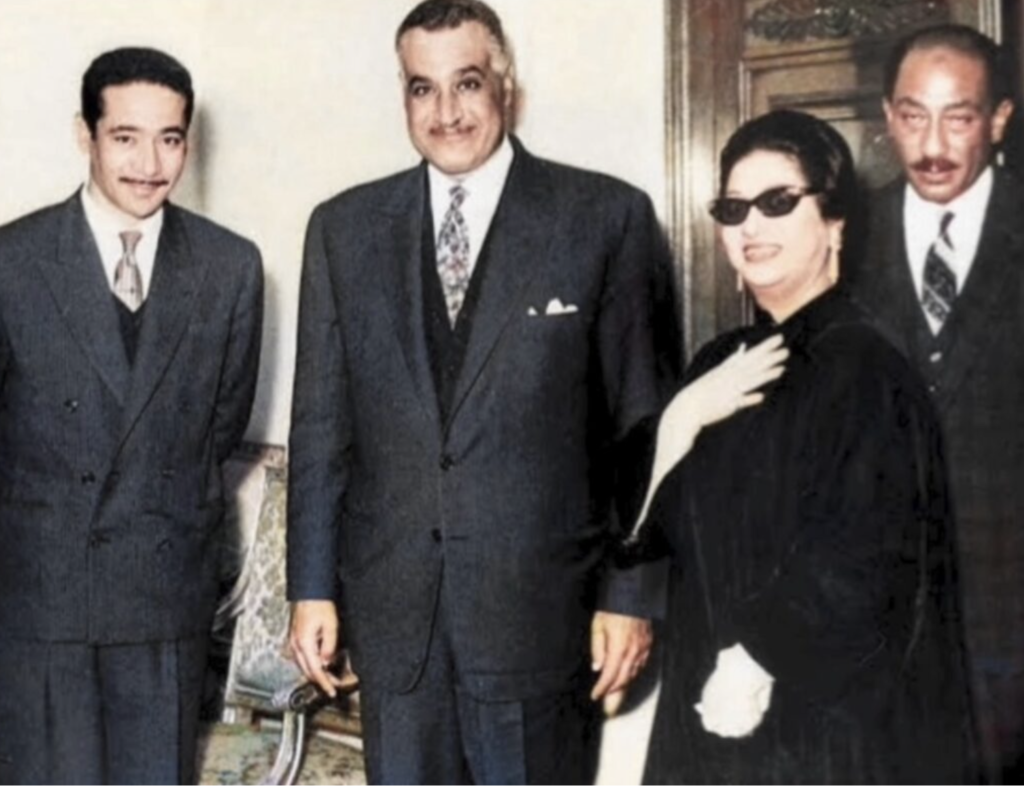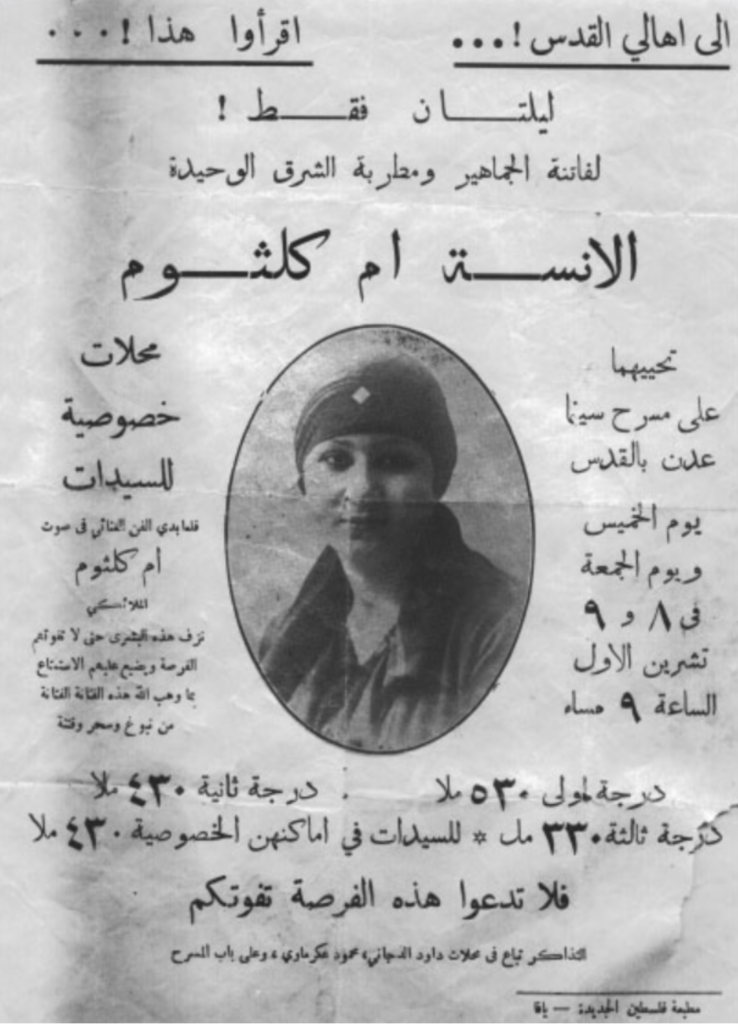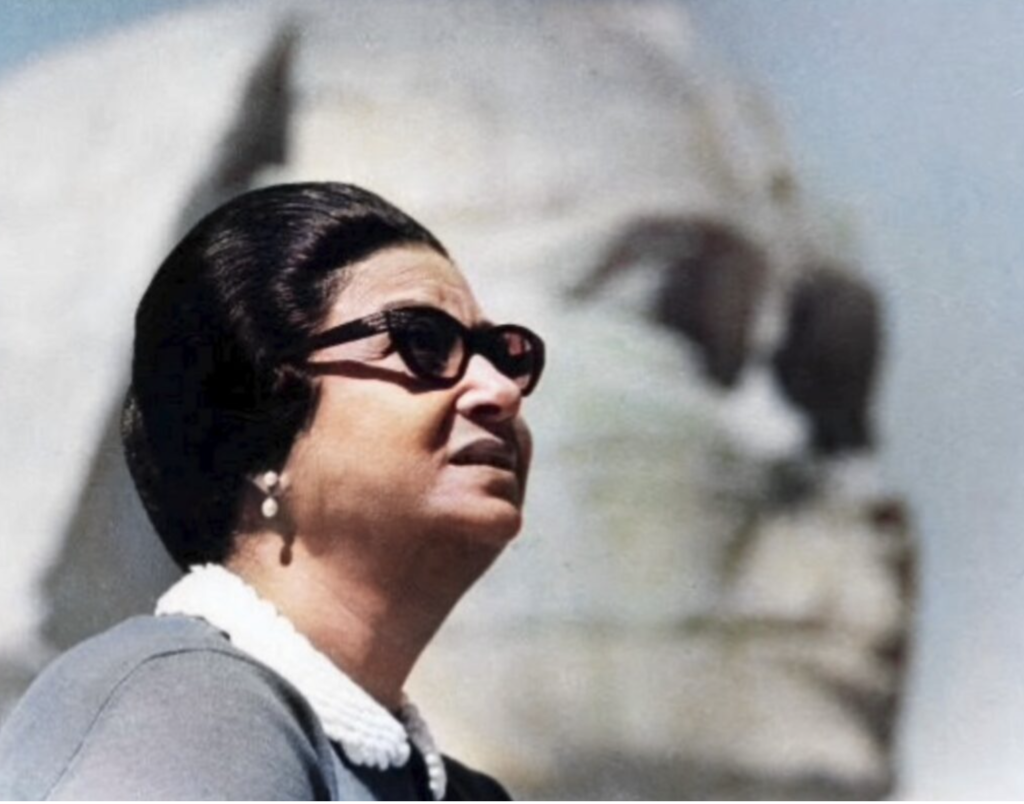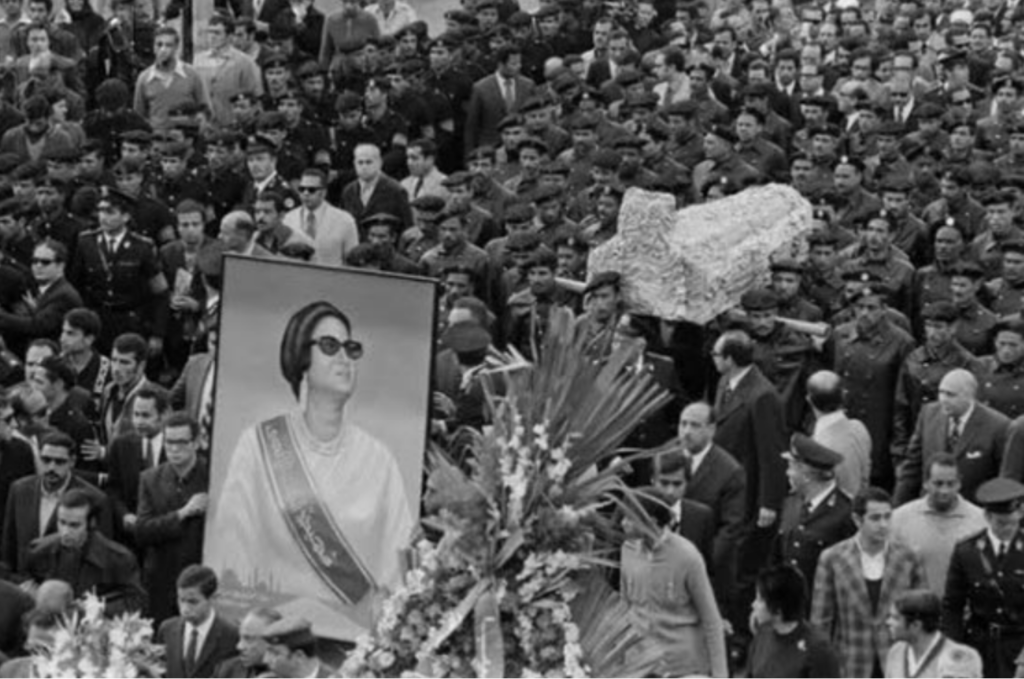Umm Kulthum and Arab Nationalism

By Liam Nagle / Arab America Contributing Writer
Umm Kulthum is known to many throughout the Arab world. Her career as a singer and songwriting artist spanned through much of the 1900s, spending much of her time in Egypt but also going abroad for various live performances. Her performances have also gained notoriety outside the Arab world, with groups and magazines ranking her as one of the greatest singers of all time. But being born into an era of European colonialism, she also became a staunch proponent of Arab nationalism – and particularly, the Egyptian government under Gamal Abdel Nasser. However, these association has resulted in some criticism stating that she was a tool for the Egyptian government under Nasser. Today, we will look into the specifics of how she supported both the cause of Arab nationalism, as well as the Egyptian government throughout her career.
Career under the Kingdom of Egypt

Umm Kulthum’s professional career began receiving the attention of political leaders in the 1940s and onwards. Having performed in various countries throughout the Arab world by now, the reigning royal family in the Kingdom of Egypt would begin requesting private performances with her, as well as attending public performances as well. In 1944, King Farouk I of Egypt awarded her one of the most prestigious medals in Egypt, the Orders of the Virtues, which granted her official knighthood status in the country.
But her affairs with the royal family would be relatively short-lived. Sharif Sabri Pasha, the maternal uncle of King Farouk I, proposed marriage to her in 1946. The Egyptian royal family, however, rejected the marriage proposal – potentially deeming her as “not being elite enough” for the family. This rejection hurt her pride immensely, but it did not end her singing career. During the 1948 Arab-Israeli War, she answered the request of Egyptian troops trapped in the Faluja Pocket to sing a particular song – and amongst those trapped would be a young soldier by the name of Nasser.
Post-1952 Career

With the success of the 1952 Egyptian Revolution which deposed the royal family, the new Republic of Egypt saw Umm Kulthum as a counterrevolutionary figure due to her accolades and private performances. This resulted in her songs being banned on public radio during one of its heights of success. Nasser heard of the news of her songs being banned and reportedly exclaimed “What are they, crazy? Do you want Egypt to turn against us?” before lifting the ban. Another debacle occurred in September of 1952 wherein the new government was in the process of appointing a new head of the Musicians Union. While individuals like Nasser supported one candidate, Umm Kulthum supported another. When the government won the debate, Umm Kulthum announced her retirement – forcing Nasser and others to personally visit her to change her opinion, and she withdrew from retirement.
This was the beginning of her outright support for Arab nationalism, and her productive relationship with Nasser. Her performances, now allowed back on the radio, were aired right before Nasser’s speeches to get maximum public attention. She shifted the topics of her songs as a reflection of her audience as well – from focusing on the aristocracy to the common people. However, this is also when her music became notably more nationalistic and pro-government. Songs such as Mansoura Ya Thawret El Ahrar (Revolution of Freemen, You’re Destined for Victory) helped to try to spread the revolution beyond the borders of Egypt, but to the rest of the Arab world. Other songs expressed outright support for Nasser, particularly Baad El Sabr Ma Taal. As time went on and conflicts with outside powers became more common, her songs also took on a tone of duty self-sacrifice for the nation.
She would later also sing the new Egyptian national anthem, Wallāhi Zamān, Yā Silāḥī, or “It’s Been a Long Time, My Weapon”. Initially, the song itself was not intended as a national anthem; instead, it was performed by Umm Kulthum during the 1956 Suez Crisis, where it was played as many as ten minutes at a time. Lyrics such as “Oh glory; oh glory! You were built up here, by our effort and sweat. You shall never turn into humility” evoked a sense of duty and honor amongst those resisting the British, French, and Israeli advance. It would later become the national anthem in Egypt due to its immense popularity, with its no-lyrics version also becoming the anthem for Iraq between 1965 and 1981.
Her career showed no signs of stopping into the 1960s. After becoming the president of the Musicians Union in Egypt, she embarked on another grand tour of the Arab world after Egypt’s defeat in the 1967 Six-Day War. Her new songs evoked a soul-searching feeling that many held after the war, such as Hadeeth el Rouh, or “Sermon of the Soul”. She also sang in direct support of Nasser after the war, with songs such as Habib el- sha’ab, or “Love of the People”.
Conclusion

Although Nasser would die in 1970, she continued to perform her pro-nationalist songs. Umm Kulthum herself would die in 1975 from kidney failure, leaving some songs unfinished. Her own funeral had four million attendees – rivaled only by Nasser himself, who had from five to six million. Her career spanned across two different governments – first the Kingdom of Egypt, and then the Republic. Despite having performed for the Egyptian aristocracy, she would later become highly influential under the Egyptian government under Nasser by performing pro-nationalist and pro-government songs. Because of this, Umm Kulthum is seen by many in two different lights; some support her for her Arab nationalist yet incredibly moving pieces, while others criticize her as being a pundit for Nasser and the Egyptian regime. Nevertheless, her music certainly inspired millions upon millions of people not just in the Middle East and North Africa, but in the world as a whole.
Check out our Blog here!








